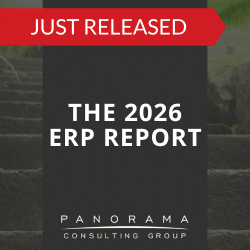- Strong ERP vendor relationship management is critical after go-live, when system performance directly impacts daily operations.
- Clear and proactive ERP vendor communication helps prevent disruptions caused by system updates and integration issues.
- Many companies face ERP vendor support issues post-implementation due to poor escalation paths and lack of structured feedback loops.
- Establishing ERP vendor accountability through business-focused SLAs and regular performance reviews helps ensure long-term success.
The complexity of your ERP system doesn’t disappear once the switch is flipped.
What happens after go-live is actually more important than the launch itself. If your team communicates effectively with your ERP vendor, resolves issues quickly, and manages updates seamlessly, your new system will deliver ROI. If not, your investment risks falling short of expectations.
This is why ERP vendor relationship management must be a strategic focus in the post-implementation phase. Today, we’re exploring how ongoing communication and collaboration play a role in sustaining ERP success after go-live.
2026 Clash of the Titans
SAP, Oracle, Microsoft, and Infor each have a variety of systems that can support data-driven decision-making. We surveyed customers of these four vendors to find out what their selection and implementation process was like.
The Importance of Post-Go-Live Vendor Collaboration
The traditional mindset has been to view ERP vendors as temporary partners: you select them, negotiate terms, endure the implementation, and then ask your internal team to handle almost everything from there.
However, today’s ERP ecosystems are sprawling, cloud-based, and deeply integrated with third-party platforms. Keeping these systems running smoothly requires ongoing updates, strong security oversight, and careful coordination with every platform they touch.
This all means that after go-live, you need to double down on communicating clearly with your vendor and holding them accountable.
Here are three reasons post-go-live vendor relationships matter more than you think:
1. Post-Go-Live is When the System Gets Tested in the Real World
- Workflows that don’t match actual processes
- Data inconsistencies that disrupt reporting accuracy and delay decision-making
- Permissions or roles that prevent employees from accessing critical functions
- Custom features that behave differently under real-world conditions
ERP vendor support issues can exacerbate these problems, especially if there’s no clear escalation path.
For example, a finance team might encounter recurring reconciliation errors that stem from configuration gaps. Without an efficient escalation process, these errors could delay month-end close and impact regulatory reporting.
Ultimately, your vendor must stay engaged—monitoring performance, listening to user feedback, and deploying timely fixes.
2. Cloud ERP Requires an Ongoing Relationship—Whether You Like It or Not
Modern ERP platforms aren’t static systems that you install and forget. In the cloud, your environment evolves constantly through updates, patches, and new releases. If your ERP vendor communication strategy isn’t proactive, these changes can disrupt business processes and break critical integrations.
A hands-off vendor relationship no longer works. You need clear accountability, consistent communication, and mutual planning.
For example, a logistics company might build a release planning committee that meets with the vendor to better prepare for quarterly updates. This would allow the internal IT team to test new features, identify risks early, and adjust training materials before changes go live.
3. You Lose Leverage After Go-Live—Unless You’ve Planned Ahead
Once your ERP system is live and embedded in your operations, your reliance on the vendor naturally grows. You’re no longer just implementing their product—you’re depending on them to deliver regular updates, resolve issues quickly, and keep the system aligned with your needs.
At this point, if the vendor disappoints, the consequences are far greater. Replacing the vendor or walking away from the system would mean unwinding custom configurations, data structures, and integration frameworks.
CEOs should prioritize ERP vendor relationship management after implementation by requesting . . .
- Regular performance reviews
- Objective, third-party-developed vendor scorecards
- Clearly defined service level agreements (SLAs) that focus on business outcomes
How CEOs Can Strengthen Post-Go-Live Vendor Relationships
Executive teams that view ERP vendor management as a strategic discipline are better positioned to extract long-term value from their ERP investment.
Here are four strategies that can fortify your vendor relationship and ensure ongoing system performance:
1. Embed Vendor Management into Your Operating Model
Create a permanent vendor management function within your IT or digital office. This isn’t just a procurement role—it’s a strategic position that interfaces with both internal business units and external vendor contacts.
We recommend assigning someone senior enough to influence priorities and escalate concerns but close enough to the system to understand its nuances.
2. Develop a Two-Way Communication Framework
ERP vendor communication can’t be ad hoc—it needs to be structured.
Our ERP selection consultants often advise clients to establish recurring touchpoints that are tied to business cycles, such as financial close periods, seasonal demand planning, or major sales campaigns.
For instance, a food and beverage manufacturer might hold quarterly planning meetings with their SCM software vendor ahead of peak production seasons. This would help ensure inventory levels, batch scheduling, and distribution workflows are fully aligned—and give the vendor time to address any performance concerns before demand surges.
3. Hold Vendors to Business-Level SLAs
We recommend renegotiating your SLAs to reflect business outcomes, such as:
- Timeliness of month-end close
- Accuracy of demand planning reports
- On-time order fulfillment rates
Then, require your vendor to report against these. This will elevate the conversation from system stability to enterprise performance.
4. Reinforce Internal Accountability
It’s easy to pin post-go-live challenges on the vendor, but many issues stem from internal gaps: insufficient training, unclear process ownership, and outdated workflows.
Holding your ERP vendor accountable only works if your internal team is empowered and adequately resourced. This means ensuring employees are trained, processes are clear, and responsibilities are well defined.
For example, an electronics distributor might find that many warehouse employees are reverting to Excel. Addressing the root cause internally would give the leadership team a stronger position to hold the vendor accountable for system performance, rather than masking internal issues as vendor shortcomings.
Learn More About ERP Vendor Relationship Management
Many companies are living with ERP systems that technically “went live” but haven’t truly stabilized. Users struggle with system errors and missing functionality, while the project team tries to manually patch broken workflows with temporary fixes.
Post-go-live vendor relationships are one of the least visible but most powerful levers you have to influence implementation outcomes. When something breaks—or when you want to build something better—a strong vendor relationship makes a difference.
Our independent ERP consultants can help you ensure that your ERP vendor is meeting expectations and that your leadership team is watching them closely. Contact us below to learn more.













